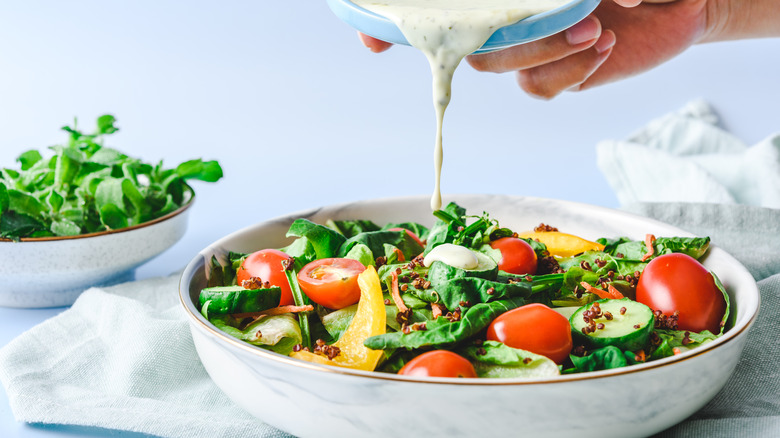Low-Fat Salad Dressing Isn't As Healthy As You Think
The crusade against fat created one of the most popular movements in dieting history, resulting in the development of hundreds of low-fat and fat-free food items. Grocery store shelves are filled with an array of options ranging from low-fat peanut butter to salad dressing. While they are sold as healthy alternatives, some of these foods and condiments are not as healthy as you might think.
Low-fat salad dressings, which were created to make salads more healthy, might actually be doing your body more harm than good. For starters, some might contain a high amount of sugar or other unhealthy sweeteners, such as high-fructose corn syrup. Other culprits that are not doing you any favors include preservatives, sodium, and trans fats.
Trans fats are different from other fats because they are processed to extend the shelf life of certain foods. They lower high-density lipoproteins (good cholesterol) while raising low-density lipoproteins (bad cholesterol), and they also increase the risk for heart disease, type 2 diabetes, and stroke (via Mayo Clinic).
Avoid these unhealthy ingredients
A recent study revealed that the amount of sugar is higher in low-fat dressings than it is in the regular versions. Too much sugar in the diet is linked to heart disease and chronic inflammation (via Harvard Health Publishing). High-fructose can increase your risk for fatty liver disease and diabetes (via Healthline). Artificial sweeteners, another common ingredient in low-fat dressings, are no better because they are known to raise your chances of becoming obese (via Smithsonian).
Like sugar, food manufacturers add salt to many low-fat foods to add flavor. However, too much sodium in your diet could lead to high blood pressure issues, stroke, and heart failure (via the American Heart Association). Preservatives have their own dangers as well, including sulfites which can trigger asthma, and sodium nitrates, which are linked to colon and pancreatic cancer (via Livestrong).
While these ingredients may seem more damaging than you originally thought, remember that consuming them in moderation is usually okay (and unless you're dousing your salad in lots of dressing, an occasional teaspoon or two is fine). However, if you want to make sure you're having a healthier salad dressing, the first three ingredients should be water, oil, and vinegar, according to Self. Also, make sure that there is no more than .5 grams of saturated fat per serving. To make it easy, you can use these recipes to create your own healthy salad dressings at home.


